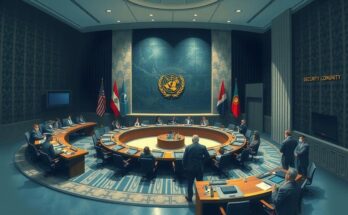Donald Trump’s shifting foreign policy potentially complicates the supportive relationship between Xi Jinping and Vladimir Putin. Analysts note concerns that the US may be attempting to weaken this alliance through renewed dialogues with Russia. Meanwhile, China’s military activities emphasize its assertiveness in international relations, especially regarding Taiwan, as it seeks to strengthen its role as a global power and mediator.
As the global order shifts under Donald Trump’s recent policies, the rapport between Xi Jinping and Vladimir Putin faces potential upheaval. The two leaders, often voicing their close partnership, solidified this bond by proclaiming a “no-limits” alliance shortly before Russia’s invasion of Ukraine in 2022. Despite opportunities for Xi to distance himself from Putin’s imperialistic pursuits, their alliance has since been continuously reinforced through discussions and meetings.
The recent warming relations between the US and Russia have prompted speculation among analysts regarding America’s strategy to drive a wedge between Moscow and Beijing, consequently diminishing China’s influence. Trump has engaged in dialogues with Putin while his administration’s officials have participated in talks concerning the Ukraine conflict, demonstrating a notable pivot in America’s foreign policy.
Experts suggest that Xi would be encouraged by America’s perceived retreat from global engagement. Richard McGregor from the Lowy Institute noted, “Everything Putin said that, ‘We can outlast the West,’ is turning out to be true… that is great for China.” Xi’s declarations during his conversation with Putin emphasize a resilient bilateral relationship, one that remains steadfast despite fluctuations in the international landscape.
China has endeavored to position itself as a significant global player, evidenced by its mediation efforts between Iran and Saudi Arabia. In the context of the Ukraine War, Beijing has offered proposals for peace and has actively sought a role as a diplomatic facilitator, despite allegations of its support for Russia’s military. The Chinese government has emphasized its need for energy imports from Russia, framing its economic ties as vital for national security.
Furthermore, China’s military maneuvers reflect its assertiveness in international waters. Conducting live-fire exercises near Australia indicates a strategic assessment of regional alliances and reactions to US foreign policy. Observers note that these actions underline China’s advancements in naval capabilities while seeking to gauge the resolve of US allies in the region.
The shifting dynamics surrounding Taiwan have raised concerns as well, especially considering the strong positions held by Trump’s administration. There are parallels drawn between the situations in Ukraine and Taiwan, with significant diplomatic language amendments regarding Taiwan’s status raising the ire of Beijing. The US continues to assert its commitment to Taiwan’s defense under the Taiwan Relations Act, adding layers of complexity to future potential conflicts.
The previous administration’s position on China was characterized by aggressive countermeasures, a trend that some experts believe is likely to continue. Trump’s recent discord with Ukraine’s President should alert Taiwan to enhance its image as an ally rather than an impediment in US policy, underscoring the increasing pressure on Taipei to align closely with Washington’s strategic objectives.
The evolving global landscape, influenced by Trump’s foreign policy changes, presents challenges and opportunities for Xi Jinping and Vladimir Putin’s relationship. With America’s diplomatic engagement shifting focus, Xi’s alignment with Putin may strengthen, complicating geopolitical dynamics. As China asserts itself in international waters and navigates its role in regional conflicts, Taiwan’s delicate position amid these tensions necessitates careful strategic positioning, signaling the urgency for Taiwan to reaffirm its alliance with the United States.
Original Source: www.abc.net.au




